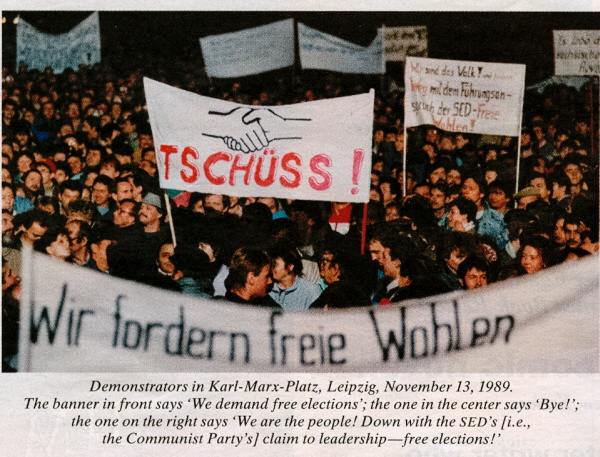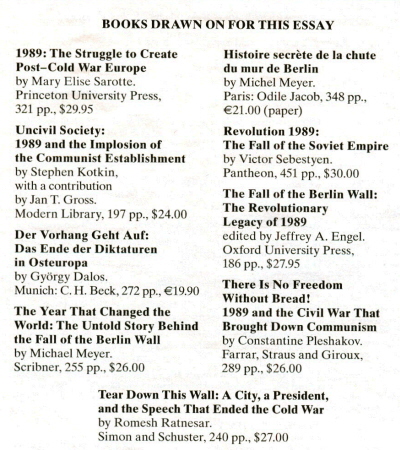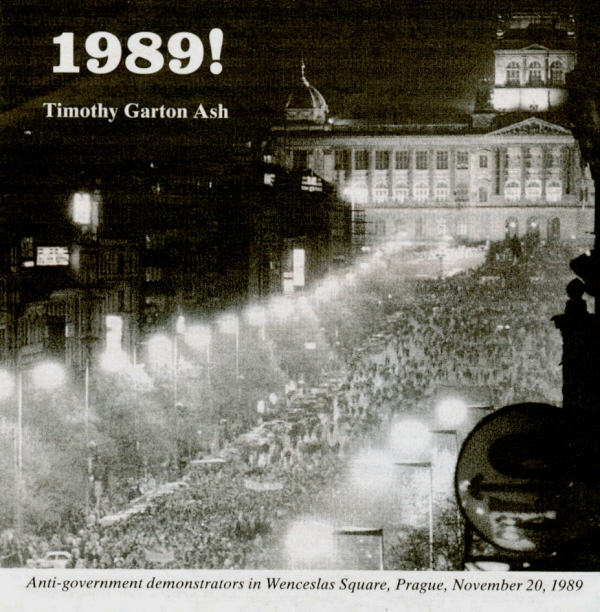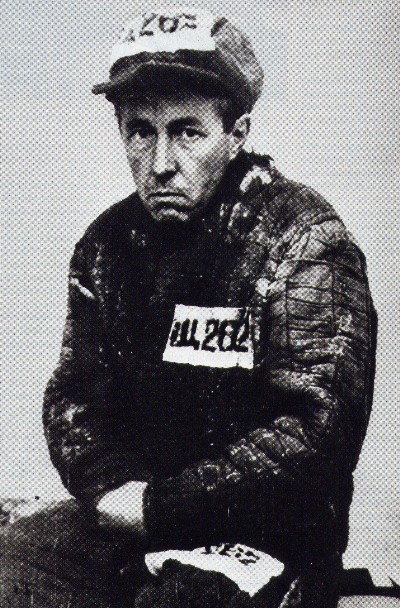|
Notes
|

Biểu
tình chống VC Đông Đức. “Băng
rốn” trước mặt: “Chúng em” đòi bầu cử tự do.
Cái ở giữa: Bye, bye VC DD!
Cái bên
phải: Chúng em là nhân dân. Đảng nãnh đạo VCDD về vườn đi - Bầu cử tự
do.

NYRB
Nov 5, 2009
Timothy Garton Ash:
1989 -
The Unwritten
History
1989 - Lịch sử không được
viết
ra
Velvet Revolution: The Prospects
Ash
viết:
Tôi trải qua nhiều giờ đứng
giữa đám đông ở Varsaw, Budapest, Berlin và Prague.
Cách ứng xử của họ thì vừa hứng khởi, vừa kỳ bí, inspiring and
mysterious. Điều
gì đẩy những cá nhân đàn ông đàn bà này ra đường phố, nhất là những
ngày đầu,
khi chẳng có chi đảm bảo an toàn? Điều gì khiến họ tụ lại thành những
đám đông?
Ai là người đầu tiên ở Prague,
lấy chùm chìa khoá ra khỏi túi và lắc lắc, khiến 300 ngàn người làm
theo, làm
thành điệu reo của những chiếc phong
linh?
Anatoly Chernyaev, tùy viên
của Gorbachev, ghi nhật ký ngày 10 Tháng 11, về sự sụp đổ Bức Tường Bá
Linh:
Đây là điều Gorbachev đã làm. Ông ta ngửi ra bước đi của lịch sử và
giúp nó
kiếm ra một lối đi tự nhiên. Thật là xấu hổ nhục nhã cho một con dân
người
Anh, khi bà thủ tướng sắt của họ, Margaret Thatcher có vẻ như đã phản
bội những
lời hứa công khai của bà với nước Đức: “Chúng tôi không muốn sự thống
nhất của nó”.
Bài viết của Ash là một trong ba viết; hai bài sau nhìn về thời kỳ
hậu-1989, và những viễn tượng của cuộc 'cách mạng nhung'.
Những cuộc cách
mạng 1989
Berlin
Wall
November 9th
by George Packer
Germany observes no official holiday on November
9th, the day
when, twenty years ago, crowds of stunned, delirious East Germans
breached the
Berlin Wall. This is because November 9th is also the date on which
Kaiser
Wilhelm abdicated, in 1918, two days before Germany’s
defeat in the First World
War. On November 9, 1923, Hitler attempted to overthrow the Weimar Republic,
in the Munich Beer Hall Putsch. In 1938, November 9th was the Night of
Broken
Glass, when Nazi gangs attacked Jews and their property across Germany and Austria,
foreshadowing the genocide
to come. The German calendar is appropriately inconvenient: nothing
good is
conserved without the active remembrance of something bad. The British
writer
Timothy Garton Ash has called 1989 the best year in European history.
It
delivered the Continent from its worst century—the new democratic
European
unity that began in 1989 was built on fifty million graves.
The
chain reaction of
nonviolent civic movements in Poland,
Hungary,
East Germany,
and Czechoslovakia
seemed like a
miracle at the time, and it still does. Anyone who grew up knowing
nothing but
the Cold War could scarcely imagine that the world wasn’t eternally
locked in
permafrost. No Hegelian teleology predetermined that Communism would be
left on
the ash heap of history. In 1989, Francis Fukuyama published his essay
“The End
of History?,” in which he predicted “the universalization of Western
liberal
democracy as the final form of human government.” This proved far too
optimistic for the post-Cold War world, and even in Central Europe, where liberal democracy did
emerge, the dramatic events
that brought it about were messier and chancier than the dreams of
neo-conservative philosophers.
The wall came down not
because Ronald Reagan stood up and demanded it but because on the
evening of
November 9th, at a televised press conference in East
Berlin, a Party hack named Günter Schabowski flubbed a
question
about the regime’s new, liberalized travel regulations. Asked when they
took
effect, Schabowski shrugged, scratched his head, checked some papers,
and said,
“Immediately,” sending thousands of East Berliners to the wall in a
human tide
that the German Democratic Republic could not control. Soldiers and
Stasi
agents didn’t shoot into the crowd, but things could easily have gone
otherwise.
The revolutions of 1989 were
made possible by a multiplicity of conditions: the courage of East Bloc
dissidents and the hundreds of thousands of fellow-citizens who finally
joined
them; American support for the dissident movements and containment of
the
Soviet Union; the disastrous economies of the Communist countries; the
loss of
confidence among ruling-party élites; the crucial forbearance of
Mikhail
Gorbachev. For Europe’s Communist regimes to disappear so suddenly and
bloodlessly (Romania
was a different story), everything had to fall into place, above and
below,
within and without. Such circumstances are improbably rare, and they
can’t be
mechanically replicated by the laws of history or by divine design or
by
universal human aspiration. A false lesson drawn from 1989 involves a
kind of
shallow eschatology of totalitarianism: this is how it always
happens—the
people rise up, the regime withers and dies, peace and democracy reign.
The
chaos that followed the overthrow of Saddam Hussein was in part a
consequence
of this thinking. In planning the postwar period in Iraq,
George W. Bush and some of his advisers had 1989 in mind—“like Eastern Europe with Arabs,” as one official put
it.
The last, briefest, and most
thrilling of that year’s peaceful uprisings, the Velvet Revolution,
took place
in Czechoslovakia.
Over the next two decades, it produced a series of successors and
imitators in Serbia,
Ukraine,
and Georgia.
While they all improved the politics of their respective countries,
none of them
had a Václav Havel, and none of them created a stable liberal
democracy.
Whenever things fail to turn out as they did in Central
Europe, people tend to react as if history had
unaccountably
malfunctioned. But if 1989 were the rule and not the exception, then
Burmese,
Chinese, and Zimbabwean dissidents—who have sacrificed far more than
their
European counterparts (in China,
1989 meant Tiananmen Square)—would be
in power
by now.
Perhaps the closest
contemporary analogy to the fall of Communism is the democratic
movement that
is challenging the Islamic Republic of Iran. It has deep social and
intellectual roots, a growing mass following, and an enemy state with a
hollowed-out ideology. But, unlike the East German soldiers and the
Stasi
agents, the Revolutionary Guards and the Basij militia are ready to
kill.
Behind President Mahmoud Ahmedinejad and Supreme Leader Ali Khamenei,
there is
no restraining figure like Gorbachev. Iranians will have to find their
own way
to the fulfillment of their democratic desires. And yet the fact that
the
nearest counterparts to the thinkers and activists of 1989 are to be
found in a
non-Western, Muslim country exposes another false lesson of that year:
that
such things are for Westerners only, that “they” don’t want what “we”
want.
A recent Pew poll shows that
Germans, Czechs, and Poles remain relatively enthusiastic about
democracy and
capitalism; Hungarians, Bulgarians, and Lithuanians less so. Former
East
Germans’ hopes of achieving the living standards of their Western
countrymen
have not been fulfilled, and the inevitable disappointments have muted
anniversary celebrations. Last month in Dresden,
a retired schoolteacher acknowledged the pining of some East Germans
for their
simpler, cozier former lives under state socialism. There’s even a
neologism
for it: Ostalgie. But, the teacher
said, “What matters is that I can talk with an American journalist
without
going to jail, that I can travel without filling out forms, that I can
read
what I want to read, that I’m not told what TV station I can watch and
not
watch, that at school I don’t have to say something that I don’t say in
private
at home. This is what is decisive to me today.”
Twenty years after the
revolutions of 1989, Europe’s bitter
half
century of armed division is the object of profitable kitsch. At
Checkpoint
Charlie, in central Berlin,
where an East German guard opened the gate at 11:17 P.M. that November
9th, you
can now pay a euro to pose with hucksters wearing Soviet, British,
French, and
American uniforms. Neighborhoods that used to be separated by the wall
have
become hotbeds of the art scene, the gay scene, and the club scene.
Meanwhile,
Germans widely regarded the recent election campaign, in which
fundamental
issues were avoided, as a snooze. Berlin
will
never again be the hair-trigger focus of global ideological conflict,
and Europe’s place at the center of
modern history is over.
This proves not the failure of 1989 but, rather, its astounding
success. No one
is prepared to die for European unity, and no one will have to. ♦
Wall Stories
No
worthy successor, yet,
to Solzhenitsyn
Chưa
có đệ tử xứng đáng để truyền y bát!
Missing in all this is a
powerful voice from the countries concerned. Writers such as
Solzhenitsyn,
Czeslaw Milosz, a Polish poet, and Czech novelists such as Milan
Kundera, Ivan
Klima and Josef Skvorecky helped the world understand life under
communism. But
no writer from the region, in fact or fiction, has produced a matching
account
of the collapse of the Iron Curtain and its aftermath. The way in which
the
countries of central Europe, the
Baltics and
the Balkans emerged from communist captivity, made peace (mostly) with
their
history, and rebuilt the economic, legal, moral and psychological order
destroyed five decades previously is a gripping story. It has yet to be
fully
told.
Thiếu, trong tất cả ở đây, là một tiếng nói mạnh mẽ từ những xứ sở được
quan
tâm. Những nhà văn như Solzhenitsyn, Czeslaw Milosz, một thi sĩ Ba Lan,
và những
tiểu thuyết gia
Czech như
Milan Kundera, Ivan Klima, và Josef Skvorecky giúp
thế giới
hiểu cuộc sống dưới chế độ Cộng Sản. Nhưng chưa một nhà văn nào trong
vùng, bằng
sự kiện hay bằng giả tưởng, tạo ra được một tác phẩm xứng hợp, ngang
hàng với
những tầm vóc nói trên, để kể cho chúng ta nghe, về cái sự sụp đổ của
Bức Màn
Sắt, và những gì tiếp theo sau. Con đường mà qua đó, những xứ sở vùng
Trung Âu,
vùng Baltics và những con người Balkans vượt ra khỏi sự giam cầm của
chủ nghĩa
Cộng Sản, làm hòa [hầu hết] với lịch sử của chúng, và tái tạo dựng trật
tự kinh
tế, hợp pháp, đạo đức, tâm lý, bị phá huỷ trong năm thập niên trước đó,
thì quả
là một câu chuyện kỳ tuyệt, câu chuyện đó chưa được kể ra một
cách đầy
đủ.
Ui chao bao giờ thì Mít có cái sự sụp đổ Bức Màn Tre?
[Mặc dù đếch còn một cây tre nào!]
Nói chi chuyện kể về nó?
|
|




